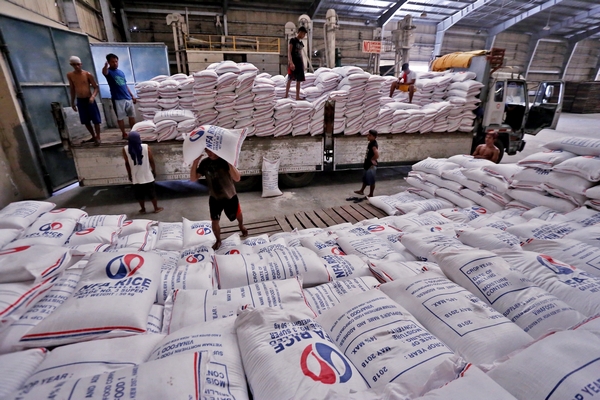
Workers unload sacks of imported rice from Vietnam to the warehouse of the National Food Authority (NFA) in Cebu. |CDN file photo
CEBU CITY, Philippines — Farmers and rice production.
These are the two areas that the National Food Authority in Central Visayas (NFA-7) will focus on with the loss of NFA’s regulatory functions following the signing into law of the Rice Tariffication Bill.
NFA-7 Regional Director Fernando Nuñez, told Cebu Daily News Digital in an interview, that the law would allow them to focus on the farmers and the development of the rice production in the region.
“Wala man gyod ta nagkuwang og bugas dinhi sa Central Visayas. Naa tay madawat enough rice from Luzon and Mindanao,” said Nuñez about the alleged shortage of rice supply last year which pushed the rice prices up in the country.
Read more: Gov’t urged: Ease Rice Tariffication Law’s effects on farmers with programs to boost rice production
Once the law will be implemented, the NFA will be stripped of its power to implement negotiable warehouse receipts for grains, inspect grains for inventory, register, license and supervise warehouses and mills, and to regulate the grains trade.
The reason for this is that the law will in effect help stabilize the supply of rice in the country, and the NFA will no longer be required to manage the stabilization of the rice supply.
The Rice Tariffication Law will lift the limit of rice imports of importers to the country, but it will also entail the importers to pay 35 percent of tariff for their imports.
The tax the government will receive from the importers will go to the Rice Competitiveness Enhancement Funds (RCEF) which will help local farmers improve their produce.
Read more: Arroyo: Rice Tariffication Law to help farmers improve productivity, competitiveness
Although the NFA will lose its regulatory power, it will still be tasked to maintain a rice buffer stock, which will be used in emergency situations and to sustain the government’s disaster relief programs sourced from local farmers.
Meanwhile, Nunez said he would like to focus on the farmers and rice production since the rice supply would be expected to normalize with more rice being imported from China and Vietnam.
Read more: Cebu Coop leader tells gov’t: Help our sector participate in rice importation
“In the long run, this is for the farmers so that our production will improve, and we can soon compete with importers,” said Nuñez.
Nunez, however, said that the new law might make the Philippines to become dependent on rice imports, which could be a problem if calamities would affect the rice supply of the country where the rice was imported from.
He said this might destabilize the supply of rice in the Philippines.
However, Nunez said that the NFA and the Department of Agriculture were working together to make sure that in the following years, the rice production of the Philippines could already sustain itself and it would no longer need to import rice from other countries.
“I still hope, and I can still see a future where the Philippines is rice sustainable,” he said./dbs